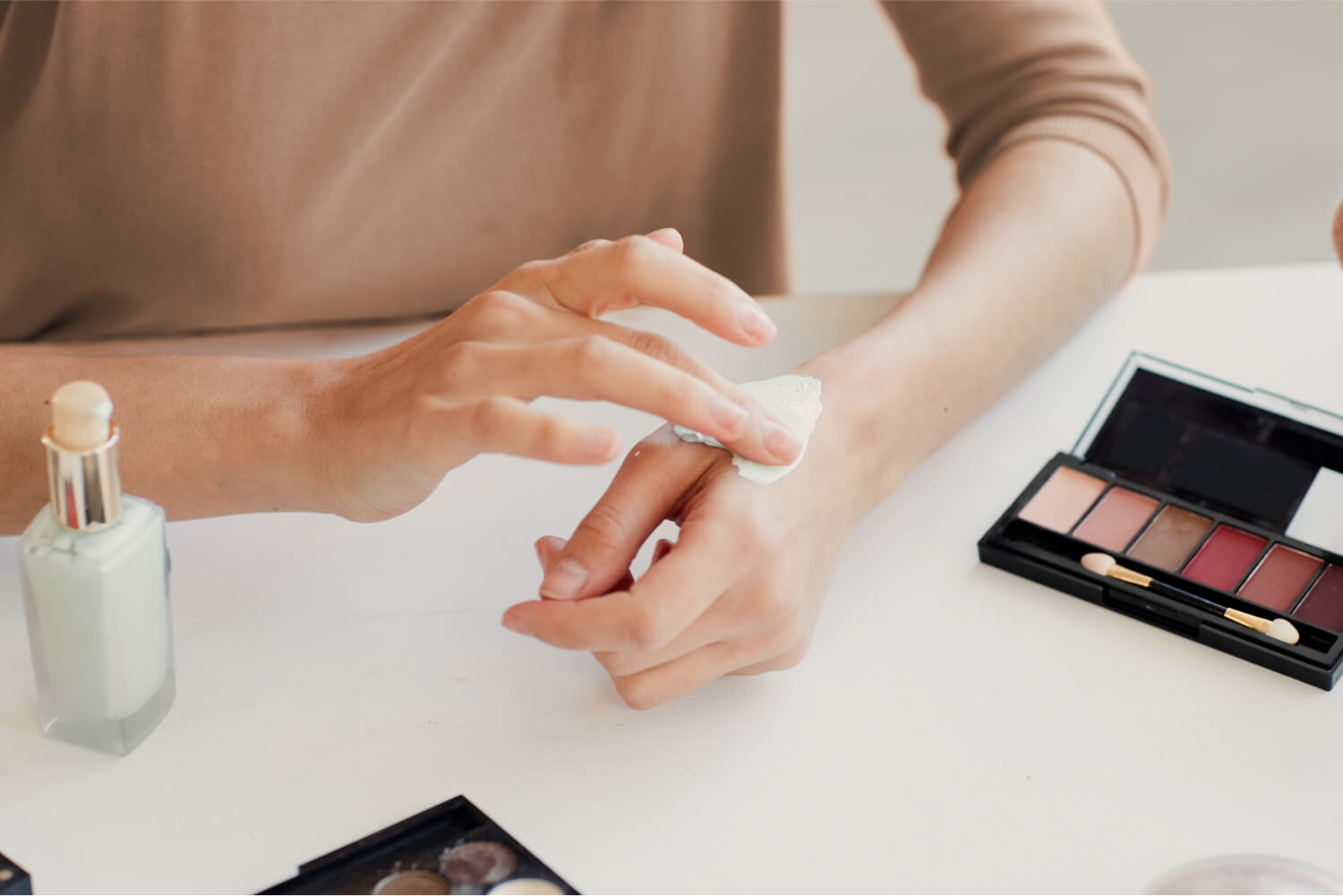
Here at Care to Beauty, we have one goal: to ensure you have access to all cosmetics at your fingertips. It’s no coincidence that we have thousands of different products available in the shop: we want to make sure you get the widest possible choice. There’s a flip side, however: with so many options, it’s easy to feel lost. What’s the best skincare serum ever? What’s the moisturizer to defeat all moisturizers? What’s the ultimate sunscreen product? There are no easy answers to these questions–and that’s why we have an in-house team of cosmetic experts who are always ready to jump to your rescue. Over their many years of experience in the beauty industry, our specialists have come up with 10 skincare “rules” to guide them when it’s time to create skincare routines–whether theirs, or yours.
Today, we’ll let you in on these secret rules: the guidelines our experts use to navigate the ever-expanding world of beauty. We hope they come in handy!
1. Manage your expectations
We all have skincare goals—a skincare destination, if you will—, but skincare is first and foremost a process. Results take time and patience, so it’s important to set realistic goals when embarking on your skincare journey.
This is true for most skin concerns, but especially true for skin conditions like acne or hyperpigmentation. Cosmetic skincare can be a huge help when dealing with these conditions, but it’s got its limitations. Sometimes you have to escalate things with your dermatologist or healthcare provider, and that’s just how it is.
Here at Care to Beauty, we love our skincare, but we know it won’t magically solve all your problems. That’s why it’s so important for us to help you set achievable, realistic goals.
2. Keep your routine simple and consistent
Ten-step skincare routines are perfectly fine—if you can keep up with them. What we’ve found, though, after our many years working in the beauty industry, is that complex routines can sometimes do more harm than good. You may struggle to mix and match your products. You may get your daytime and nighttime routines confused. You may be piling on so many ingredients that you can’t quite tell what’s working anymore.
In our experience, a simple and consistent skincare regimen is the way to go. As product specialists, we can help you put together a simple, effective routine made up of ingredients that work or you. Then it’s up to you to stick to it, day in, day out!
3. Wear sunscreen all day, every day
Ask anyone in our team and we’ll tell you sunscreen is key. Key to what, exactly? Everything: preventing sunburn, minimizing photoaging, managing skin conditions like hyperpigmentation, reducing your risk of developing skin cancer, and so much more.
At Care to Beauty, we encourage the daily use of sunscreen all day, every day, all through the year, whether you’re outdoors or indoors. Dramatic as it may sound to say this: sunscreen is pretty close to a non-negotiable for us.
4. Try new skincare ingredients one at a time
Trying out a new skincare product can be incredibly exciting. Will this new product be the one that changes your life for the better? What’s it going to feel like on your skin? Will it work with everything else in your routine? Sometimes, you just can’t wait to find answers to these questions.
However, there’s a risk with experimenting with new skincare products. If you try out a bunch of new things at a time, you won’t know what’s working and what’s causing harm. This is especially true if you’re introducing active ingredients you haven’t used before.
To help you solve this dilemma, we’re big proponents of introducing new ingredients one at a time. This way, you can easily figure out whether something it works for you, or whether it’s a trigger for any reactions or sensitivities. Patience and consistency are, once again, key!
5. Recognize that INCI lists have their limitations
Ingredient lists—or INCI lists, meaning International Nomenclature of Cosmetic Ingredients—can be informative, but they don’t tell you the whole story. An INCI list may tell you whether a product contains X or Y ingredient, but it won’t tell you anything about the concentration or origin of said ingredient.
Most importantly, an INCI list can’t tell you how ingredients work in synergy with one another—which is, arguably, the whole point of buying a product that an expert cosmetic formulator has created with specific skin types and concerns in mind!
We’re all for transparency, and this is part of that commitment. We want you to know that, while it’s perfectly fine for you to read your INCI lists from start to finish, you won’t necessarily find all the information you need in there. You’ve got to trust the formulator!
6. Stop demonizing synthetic ingredients
You may have heard that “chemical” ingredients are bad and “natural” ingredients are good, but we respectfully disagree.
There’s a whole lot of confusion out there regarding “chemical” ingredients. Skincare fans often use the word “chemical” to describe ingredients created in a laboratory, but that’s not very precise. Although chemistry is often associated with lab work, it’s not correct to refer to lab-grown ingredients as “chemical”—because, scientifically speaking, everything is a chemical compound. Water itself is a chemical compound! For this reason, “synthetic” may be a better word to describe ingredients created in a laboratory.
So that’s that on terminology. Now let’s get to the fearmongering: are synthetic skincare ingredients bad for you? Not at all. Most synthetic ingredients have been researched and developed to benefit your skin; they are safe, effective, and often indistinguishable from natural equivalents (which, by the way, aren’t necessarily beneficial just because they’re natural).
At Care to Beauty, we like a balanced perspective: we believe there’s room for both synthetic and natural ingredients in a skincare routine. Whatever works for you!
7. Know that what works for someone else may not work for you
Every person is unique, and so is their skin. This may sound like a very poetic tagline, but it’s actually a guiding principle for us at Care to Beauty: if you come to us for advice, we’ll help you build a skincare routine that works for you. It may not work for your sister or your best friend—but it must work for you.
This is also important to keep in mind if you’re around online skincare communities. Trendy products may look like they work wonders, but they won’t necessarily work for you. Personalizing is key to an effective skincare routine, and we’re here to help you figure it out.
8. Understand how your overall health impacts your skin
The skin is the largest organ of the body, and it’s intimately connected to your health and well-being. Your eating and sleeping habits, your stress levels, and your water intake (or lack thereof) all play a significant role in the appearance of your skin.
In short: your physical and mental health are closely intertwined with the health of your skin, and this is worth keeping in mind. No skincare journey is complete with just a handful of products in shiny new packaging.
9. Remember that higher concentrations don’t always equal better results
There’s this tendency in some skincare circles to always seek out the strongest, most powerful, most concentrated active ingredients. Stronger products should yield better results, right? Not necessarily.
There are plenty of reasons why this may not be true for you. You may have sensitive skin, to start with. You may not have enough experience with a given ingredient to try out a high concentration right away. You may be using other products that clash with the new ingredient. You may have a damaged skin barrier—and going straight for a high concentration of a new active ingredient is sure to cause further damage!
If you’re trying to decide whether to go for the lower or higher concentration of a new skincare ingredient, opt for moderation. Start with a low concentration and see how your skin fares. If you find that your skin can handle the “starter” product, you can consider amping up the concentration.
10. Seek professional advice when necessary
When dealing with particularly complex skin conditions, skincare may not cut it. You may need professional help, and that’s part of our job too—to tell you when you should start looking away from cosmetic skincare and toward a visit to your dermatologist or healthcare provider.
In fact, this is valuable advice even if you don’t have any particular skin concerns. If you’re invested in the health and well-being of your skin, a regular visit to a dermatologist can be a valuable habit. A good dermatologist will be able to advise you on the condition of your skin and help you detect any changes that may be of concern.
We hope these 10 tips are useful to you. Maybe they’ve already made you rethink your skincare routine, or maybe they’ll pop into your mind the next time you want to buy a skincare product. If you still feel like you need expert help, you know what to do: our cosmetic experts are always ready to assist you on our contact page.
Beauty Writer & Editor


